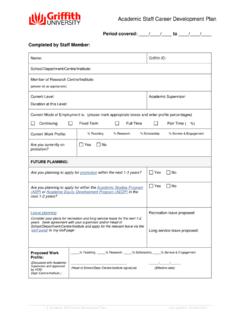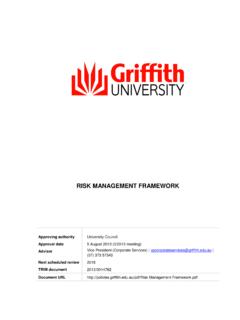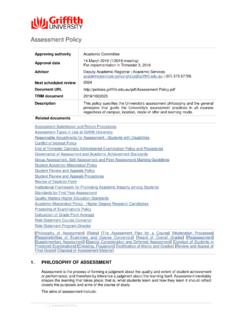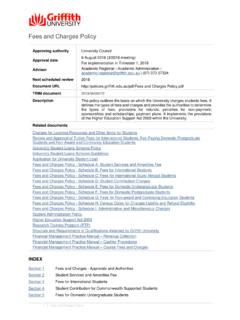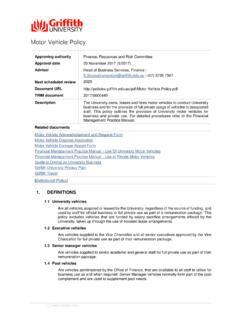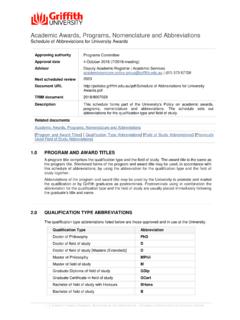Transcription of Purchasing Policy - policies.griffith.edu.au
1 Purchasing Policy Approving authority Finance, Resources and Risk Committee Approval date 20 November 2017 (5/2017). Advisor Head of Business Services | Finance |. | (07) 373 57367. Next scheduled review 2020. Document URL TRIM document 2017/0000448. Description This Policy is consistent with the Financial and Performance Management Standard 2009 and sets out the broad requirements of the University with respect to all Purchasing activities. Detailed requirements are set out in the associated Purchasing Procedures in the Financial Management Practice Manual. The Queensland Government State Procurement Policy (2017) is applicable to all Purchasing activities of the University and should be referred to for additional guidance. Related documents Financial Delegations Schedule Authority to Sign Contracts and Agreements Financial Management Practice Manual Purchasing Procedure Assets Policy Sustainability Policy Code of Conduct Conflict of Interest Policy Fraud Control Policy Gifts and Benefits Policy Hospitality Provided by the University Policy Health and Safety Policy Electrical Safety Policy Tender Board Constitution Links to external documents Queensland Procurement Policy Queensland Government ICT Procurement [ Policy ] [Information and Communication Technology (ICT) Purchasing ] [Purchase of Hazardous or Licensable Materials] [Sustainable Procurement].
2 1. Policy . Intent & Scope The University Purchasing Policy ( Policy ) outlines the principles and governance framework that will guide the Purchasing of all goods and services from suppliers external to the University. The Policy applies to all University activities (regardless of source of funds). All Purchasing must be initiated through the University Finance or Expense Management Systems and follow the requirements of the Purchasing Procedures. 1 Purchasing Policy Objectives The Policy will ensure that the acquisition of goods and services across the University complies with a minimum set of governance standards whilst delivering fair value for money and meeting the principles set out in the Queensland Procurement Policy 2017: Principle Intent Principle 1: Value for money Select the option that provides the best value for money outcomes.
3 Deploy the most appropriate strategies to deliver the best procurement outcomes. Principle 2: Advancement of economic, Ensure full, fair and reasonable opportunity for environmental and social objectives Queensland suppliers. Do business with ethically, environmentally and socially responsible suppliers. Principle 3: Integrity, probity and accountability Ensure decisions are transparent and defensible and observe high standards of integrity. Principle 4: Leaders in procurement practice Be outcome focused and look for opportunities to innovate, including continuous improvement to our procurement methods and practices. Engage with stakeholders to understand business needs and work together with industry and key stakeholders. Principle 5: Working together to achieve Take a collaborative approach to planning and outcomes managing categories of expenditure.
4 Maximize savings, benefits and reduce duplication. Principle 6: governance and planning Ensure effective governance to facilitate consultation and value for money outcomes. Manage risk through effective oversight, accountability and appropriate internal controls. Achieving value for money Value for money is not restricted to price alone. Other factors to consider include: Cost-related factors including up-front price, whole-of-life costs and transaction costs associated with acquisition, use, holding, maintenance and disposal; and Non-cost factors such as fitness for purpose, quality, delivery, service and support and sustainability considerations. Procurement will work with business areas to identify the procurement strategy and method (open, limited or selective) most appropriate for delivering the best procurement outcome. This will be based on an assessment of complexity, scope, opportunities and risks associated with procurement objectives, as well as the level of competition in the supply market.
5 Procurement will also work with business areas to identify opportunities for strategic management of spend across relevant categories. Quotation and Tender requirements It is the responsibility of a University Officer initiating a purchase to ensure that the quotation process followed is in accordance with the requirements relating to the expected cost of the purchase, as set out in the table below, and as detailed in the Purchasing Procedures. In no circumstances can a purchase be broken into components to circumvent these requirements. 2 Purchasing Policy Expected Cost of Purchase Quotation Requirements1. < $20,000 One quote $20,000 to < $200,000 Three written quotes >$200,000 University Tender process to be followed 1. Exemptions to the quotation requirements above may apply in the following instances: If there is a Contract, Preferred Agreement or Standing Offer Agreement in place with a preferred supplier for that particular good(s)/service(s).
6 Where a preferred panel has been implemented (with Procurement); or Where an exemption is sought per the Purchasing Procedures. At all times, the University must ensure that all stages of the procurement process are defensible and appropriately documented relative to the value and risk associated with the procurement. Financial Approval Financial approval must be obtained for each purchase on behalf of the University. It is the approver's responsibility to confirm that goods/services are needed to conduct University business; that the purchase is within Policy and that appropriate funds are available/within budget. The Financial Delegations Schedule sets out relevant financial approval authority by position and value of purchase. Conflict of Interest The University has a responsibility to ensure that its official activities and those of its staff conform to acceptable standards of integrity and good conduct.
7 All employees, officers and agents of the University involved in the drafting, selection, award or administration of a purchase are required to comply with the requirements of the University's Conflict of Interest Policy , including the disclosure of conflicts to the appropriate officer under the Policy and any further action that may be appropriate to manage and monitor such conflict. A staff member may also be asked (by Purchasing ) to declare no Conflict of Interest when recommending/proceeding with a supplier's quotation by satisfactory completion of the applicable form. 2. INFORMATION AND COMMUNICATION TECHNOLOGY (ICT) Purchasing . Queensland Procurement Policy requires that the University use the Queensland Information Technology Contracting (QITC) framework when Purchasing information and communication (ICT). goods and services. The QITC contains standard contractual terms and conditions for use in ICT.
8 Procurement activities. When ordering computer software all software requests must be submitted through the Software Request shopping cart system. 3. PURCHASE OF HAZARDOUS OR LICENSABLE MATERIALS. Hazardous or licensable materials, including chemical, biological and radiation sources and apparatus, drugs and poisons, and genetic or quarantine materials must not be purchased, or otherwise acquired, without verification and acceptance by a Special Approver. The special approval process is part of the online purchase request system. All purchases of such material must be made through the Peoplesoft Purchasing system or Griffith marketplace to ensure special approvals are completed and recorded on the system. When there is doubt as to whether a particular purchase constitutes a 'hazardous or licensable material'. for the purposes of this Policy , the purchase must be referred to for assessment.
9 3 Purchasing Policy Purchasers of hazardous or licensable materials are required to undertake appropriate risk assessments and to observe all necessary legislative and/or licence requirements relating to the safe transport, storage and use of such materials. 4. SUSTAINABLE PROCUREMENT. The University integrates sustainability considerations into the procurement of goods, services and construction. Undertaking sustainable procurement contributes to sustainable development and environmental protection. In addition, as part of the University's Reconciliation Action Plan (RAP), the University endeavours to expand the number of Aboriginal and/or Torres Strait Islander suppliers that the University uses, where appropriate. Further information on how to incorporate sustainable procurement practices into day to day purchases can be found in the Purchasing Procedures.
10 4 Purchasing Policy

